[Transcriber's note: As pages 23 and 24 were missing from the original scanned booklet
they were not included in this transcription.]
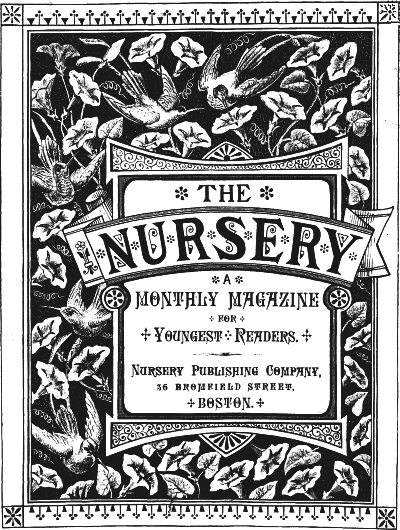
No. 169. JANUARY, 1881. Vol. XXIX.
THE NURSERY
A MONTHLY MAGAZINE FOR YOUNGEST READERS
NURSERY PUBLISHING COMPANY. 36 BROMFIELD STREET, BOSTON
$1.50 a year, in advance. 15 cents a single copy.
Entered at the Post Office at Boston as Second-Class Matter.
Entered according to Act of Congress, in the year 1880, by THE NURSERY
PUBLISHING CO., in the Office of the Librarian of Congress at
Washington.
CONTENTS OF NUMBER ONE HUNDRED AND SIXTY-NINE.
| PAGE | ||
| THAT MERRY CHRISTMAS | By Uncle Charles | 2 |
| BABY'S QUIET FAMILY | By W.G. | 3 |
| BABY AND THE BIRD | By A.B.C. | 4 |
| A NEW YEAR'S DIALOGUE | By Marian Douglas | 5 |
| THE SHEEP FOLLOW THE SHEPHERD | By Dora Burnside | 7 |
| "A FRIEND IN NEED" | By Jane Oliver | 8 |
| "IN A MINUTE" | By Mary Addison | 10 |
| THE CHRISTMAS-TREE | By George S. Burleigh | 12 |
| DOWN THE RIVER AFTER THE BOY | By Alfred Stetson | 14 |
| "FLUTTER, FLUTTER!" | By Mary N. Prescott | 16 |
| DRAWING-LESSON | By Harrison Weir | 17 |
| CHRISTMAS BELLS | By George Cooper | 18 |
| JACK THE MAGPIE | By Aunt Sadie | 19 |
| PORTRAITS FOR LITTLE FOLKS | By K.G. | 21 |
| AMONG THE HOLLY-BUSHES | By Emily Carter | 23 (Missing) |
| THE BASKET OF APPLES | By Uncle Sam | 25 |
| CHRISTMAS | (Music by T. Crampton) | 32 |
A BRAIN AND NERVE FOOD.
Vitalized Phos-phites
(This differs from all other tonics because it is composed of the nerve-giving principles of the ox brain and wheat germ.) It gives vitality to the insufficient growth of children; feeds the brain and nerves; prevents fretfulness; gives quiet rest and sleep. An ill-fed brain learns no lessons, and is excusable if peevish. Restless infants are cured in a few days. For sale by Druggists, or mail, $1.00.
F. CROSBY 666 8TH AVE. N.Y.
EDITOR'S PORTFOLIO.
*** "The Nursery" is fortunate, not only in being in charge of its original editors, but in retaining the good will and hearty co-operation of its most valued contributors.
*** Among these the name of Marian Douglas deserves special mention. We present a capital poem from her pen, and are promised a series of a similar character, one of which will appear in each number during the year. The name of George Cooper is also endeared to our readers by his charming verses. A poem by him is given in this number, and we have others in store. George S. Burleigh, Emily Carter, Jane Oliver, Mary N. Prescott, and other favorites contribute to our table of contents.
*** Some choice things that came too late for this issue will appear in future numbers. Poems by Mrs. M.D. Brine, illustrated by her sister, Miss Northam, poems and sketches by Josephine Pollard, Clara Doty Bates, and others, are among the treasures held in reserve.
The Yearly Volume of "The Nursery" for 1880 is now ready. Sent by mail, postpaid, for $1.75.
Direct all communications to
THE NURSERY PUBLISHING CO.,
36 Bromfield Street, Boston, Mass.
The Nursery
1867-1881
A MONTHLY MAGAZINE FOR YOUNGEST READERS.

his unique and much-admired work, begun in 1867, and now a welcome and trusted visitor in every intelligent family where there is a child, gives in every number a profusion of
THE CHOICEST PICTURES,
Executed in the best and most costly style, and, in most cases, from original designs made expressly for the young.
ITS ARTICLES,
Whether in prose or verse, are adapted with the greatest care to the capacities of children, and are, with very rare exceptions, wholly original.
A SONG SET TO MUSIC,
By a skilful composer, and specially adapted to children's voices, is given in every number.
TERMS: Subscription Price (postage included), $1.50. Payable always in advance. 15 cents a single number. A Sample Number will be sent for 10 cents. Address all communications to
THE NURSERY PUBLISHING CO.,
36 Bromfield Street, Boston, Mass.
THE NURSERY.
WHAT THE PAPERS SAY OF IT.
If you would teach your child to read in the easiest, quickest, and most practicable way, easiest both to the child and the teacher, put "The Nursery" in its hands every month. Our word for it, you will be surprised at the result. "The Nursery" will be found a primer, a reading-book, drawing-book, story-book, and lesson-book, all in one.—Boston Transcript.
"The Nursery" is as great a favorite as ever; and all attempts to imitate it have failed. No other magazine can supply its place. No family where there are small children can afford to be without it.—Providence Press.
Among American periodicals for the young, there is not one that we can more confidently commend than "The Nursery." Indeed, there is not one of the kind in Europe that quite comes up to this.—N.Y. Tribune.
Every house that has children in it needs "The Nursery" for their profit and delight; and every childless house needs it for the sweet portraiture it gives of childhood.—Northampton Journal.
"The Nursery" continues to be without a rival in its own field, and fills its place so well that none need wish for anything better. The idea that anything is good enough for the little ones finds no place in the mind of its editor, and both stories and pictures are of the choicest.—Chicago Advance.
No better outlay of money can be made for children than in subscription to such a magazine as "The Nursery," as it affords not only pleasure, but real benefit.—Richmond (Va.) Religious Herald.
We again repeat our hope that no family in this country, in which there is a child or children, will be without this beautiful, simple, and natural little magazine.—Marshall (Mich.) Expounder.
Of the many attempts to imitate it, all have failed. We are proud of such an American journal for children.—Illinois Schoolmaster.
Teachers who have tried it say that it charms the children into learning to read. Blessings on the sunny "Nursery"! Far and near may households be brightened by its presence!—Massachusetts Teacher.
A bright, pleasant little pictorial, with which the smallest children able to read at all may be amused and instructed. Parents looking for such reading will be interested in it.—N.Y. Tribune.
"The Nursery" is the very best magazine that we know for children. It is beautifully illustrated, and the stories are always clean and pure, inculcating kindness to one another and to animals. Its lessons are all in favor of truth, honor, and honesty. It should be in every family where there are young children to be entertained and instructed.—Woman's Journal.
"The Nursery" is 'a magazine for youngest readers,' and, as we know by its use in our own family, most admirably adapted for the purpose for which it is intended.—Charleston (S.C.) Carolinian.
Those who wish to furnish their little ones, just learning to read, with something fresh,—something written with great care, and illustrated with skill, to which the ordinary 'primers' cannot and do not attain,—should provide themselves with "The Nursery."—Detroit Post.
To those of our readers who have young children of their own, or who are called on to suggest quiet amusement for little patients, we can conscientiously commend "The Nursery," a monthly juvenile magazine published in Boston, as the only periodical we have been able to find suited to the comprehension of children under ten or twelve years of age.—N.Y. Medical Gazette.
We wish we could express in fitting words our gratitude to the editor, publisher, and contributors of this exquisite little magazine. It is intended for the small boys and girls who do not read very long words; but, if we mistake not, 'children of a larger growth' will be fascinated by its charming pictures and its dainty execution.—N.Y. Liberal Christian.
Few better services can be done than to banish namby-pamby trash from
juvenile literature, and to substitute for it what is healthy and jolly
and interesting. This is the work that "The Nursery" performs for little
children, and we therefore take pleasure in its deserved success.—N.Y.
Independent.
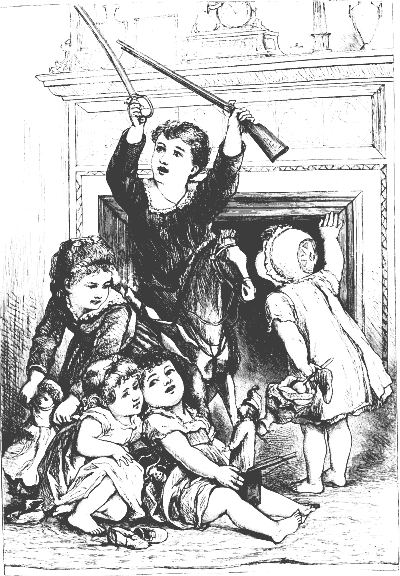 THAT MERRY CHRISTMAS.
THAT MERRY CHRISTMAS.
THAT MERRY CHRISTMAS.
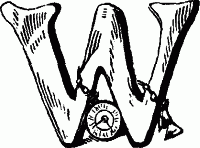
hat a glad noise there was that Christmas morning! The children had got up early to look in their stockings. John's were not quite large enough to hold all of his gifts. It is rather hard to crowd a sword, a gun, and a rocking-horse all into one stocking.
Mary had a fine new doll. Harry had a box, and, on taking off the cover, up sprang a wise-looking little man, with a cap on his head. Jessy had a doll, and a very pretty one it was too. Tommy had a what-do-you-call-it. Why did he look up the chimney? I think it was to see if there was any sign of Santa Claus.
John mounted his horse, waved his sword, and held up his gun. But very soon he began to get tired of them all. The thought came into his head that he was more than eight years old. "What do I want of these toys?" said he. "Why was I so silly as to choose them, when aunt Susan would have given me a microscope?" And John laid down his sword and gun, feeling quite above such childish things.
When aunt Susan came, she saw that John did not seem as glad over his presents as the rest of the children did over theirs. "What is the matter, John?" she asked. "Why are you not playing with your toys?"
"Aunt Susan," said John, "I wish I had taken the microscope. Is it too late?"
"No, John. I thought you might repent your choice, so I said to Mr. Grover, who keeps the toy-shop, 'I think I shall want to change the microscope: can I do so?' He said, 'Yes.' His shop will be open till eleven o'clock. So run round and get the microscope, and tell him to send to-morrow and take back the toys."
In five seconds John had on his hat, and was running down the street to Mr. Grover's. He came back with the microscope in about half an hour, and was full of joy at the change. A merry Christmas it was then for all the children!
UNCLE CHARLES.
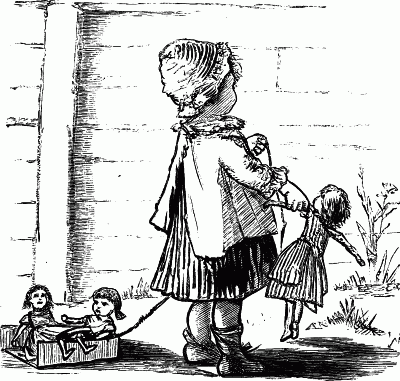
BABY'S QUIET FAMILY.
|
Whenever I walk With my children three, I laugh and I talk For the whole family. |
But I know when they're glad,— Mothers always can tell,— And I'm sad when they're sad, For I love them so well! | |
|
There's Ruth (her arm's broken!) And Jane and Annette, They never have spoken Or laughed even, yet; |
Whenever we walk, Though they're still as can be, I can easily talk Quite enough for the three. |
W.G.
BABY AND THE BIRD.
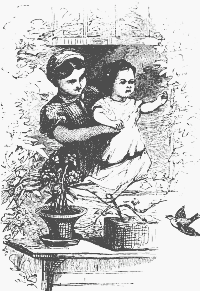
Baby is looking out of the window. Jane is holding him up so that he will not fall out. What does he see that makes him jump up and down with joy?
He sees a dear little bird. It has come for its daily meal of seed and crumbs. It is not afraid of baby? Why should it be? How could any bird be afraid of such a dear child?
When the bird has had its dinner, I think it will sing.
A.B.C.
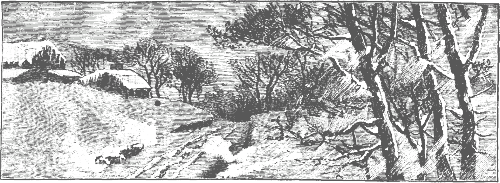
A NEW YEAR'S DIALOGUE.
HARRY.
|
Loud from the north the wild wind blows; It sweeps the blue sky clear, And parts, amid the drifting snows, The path of the New Year; The glad New Year that always brings So many bright delightful things, Gay holidays and merry plays, And loving wishes from our friends. A "Happy New Year" let us make, And keep it "happy" till it ends. By trying every day to see What good, good children we can be. |
KATE.
|
Last year, when any thing went wrong, I used to fret the whole day long, And sometimes sob and cry aloud, Dark-looking as a thunder-cloud; But, even in a gloomy place, I now must keep a sunny face; For, all this year, I mean to see How bright and cheerful I can be. [Pg 6] |
MARY.
|
Last year, the flitting butterfly Was not so idle as was I; I liked my sports and frolic well, But would not learn to read and spell: Now I must change my ways at once, Or I shall surely be a dunce. This glad New Year that has begun, Must leave me wiser when 'tis done. |
JAMES.
|
Last year, my temper was so quick, My angry words came fast and thick, And brother Tom I'd scold and strike When he did what I did not like. I am so sorry! Loving words Are sweeter than the song of birds; And, all this year, I mean to see If I a gentle child can be. |
ALL. (Four or more.)
|
The past is past; the year is new: We will be patient, brave, and true; When we are bidden, quick to mind; Unselfish, courteous, and kind; And try in every place to see What good, good children we can be. |
MARIAN DOUGLAS.

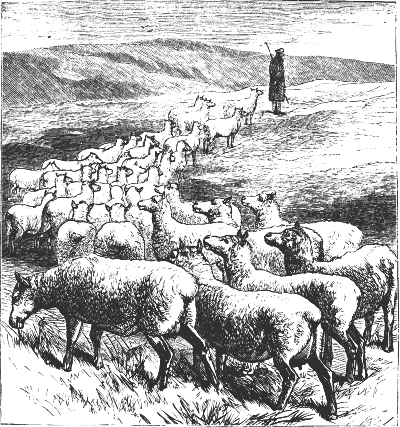 The sheep follow the shepherd.
The sheep follow the shepherd.
THE SHEEP FOLLOW THE SHEPHERD.

he tenth chapter of St. John says, "He calleth his own sheep by name, and leadeth them out. He goeth before them, and the sheep follow him; for they know his voice. And a stranger will they not follow, but will flee from him; for they know not the voice of strangers."
But may it not be the form or dress of the shepherd that the sheep know, and follow him? To test this, a traveller, who had put the question, once exchanged dresses with a shepherd, and went amongst the sheep.
The traveller in the shepherd's dress called the sheep, and tried to lead them; but "they knew not his voice," and did not move. But when the shepherd called them, though he was in the traveller's dress, they ran at once to him, thus proving that it was the voice that led them.
I have a dog that will sometimes bark at me when I put on an overcoat which he has not seen me wear before. But, the moment he hears my voice, he seems ashamed of not having known me, and will whine, as if he would say, "Pardon me, good master. It was very stupid in me not to know you. It was your coat I did not know. I will try to be wiser the next time."
DORA BURNSIDE
"A FRIEND IN NEED."

enry lived in the great city of London. He was known as "the boy at the crossing." He used to sweep one of the crossings in Oxford Street. In wet weather these crossings are very muddy. Now and then some one would give him a penny for his work. He did not make much in a day; but what he got was a great help to his mother. That thought kept him daily at his work. One day he saw a little girl trying to lead her little brother across the street. The carts and the horses made her afraid, and she ran back timidly.
"What's the matter, little girl?" asked Henry.
"I am afraid we shall be run over," said the girl.
"I'll help you across," said Henry. Then, lifting the[Pg 9] little boy in his arms, he took the girl by the hand, and led her safely to the other side of the street.
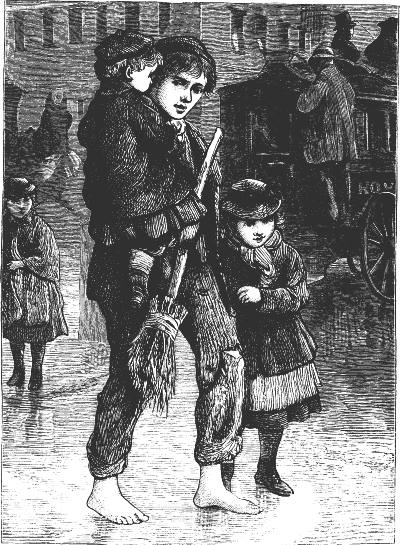
"Thank you!" said the little girl; and "Thank you!" said her little brother, as plainly as he could speak it.
I went up and asked the boy with the broom if he knew the children. "I never saw them before in my life," said he; "but such little ones can't get across without help."
"You are a good boy," said I. "I think you must have a good father."
"I had one once," said he; "but now I have only a good mother."
"Well, Henry," said I, "give her this shilling, and tell her I send it to her for teaching her boy to do good when he can get a chance."
Tears came to the boy's eyes. A shilling seemed a good deal of money to him, and it pleased him all the more because it was given him for his mother.
"Thank you, sir; thank you!" said he, and he ran back to his work one of the happiest boys in London, I think, at that moment.
JANE OLIVER.
"IN A MINUTE."

f you asked Dora to do any thing, she would reply, "In a minute." It was a bad habit she had. "Dora, please bring me a drink of water."—"In a minute."—"Dora, go up stairs, and bring me down my comb."—"Yes, mother, in a minute."—"Dora, come to your dinner."—"In a minute."
One day the bird was hopping about on the floor. Somebody went out, leaving the door open, just as "somebody" is always doing. Dora's mother said, "Dora, shut the door, or the cat will be after your bird."
"Yes, mother, in a minute," said Dora. "I just want to finish this line in my drawing." But the cat did not[Pg 11] wait till this was done. In he popped, and with one dart he had the bird in his mouth.
Down went the slate on the floor, and away went cat, bird, and Dora. There was a wild chase on the lawn. "In a minute" Dora came back weeping, with the poor bird in her hand, but, oh! the life had all been shaken out of him.
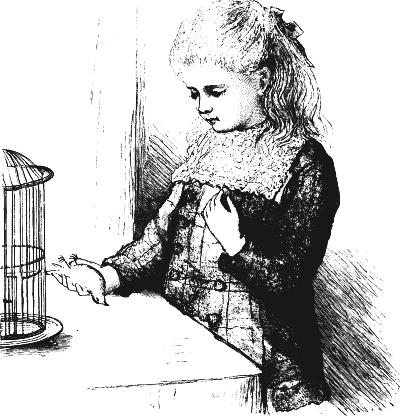
How Dora cried! Mamma was sorry for her, but said, "A great many things may happen 'in a minute,' Dora. I hope the next time you are told to do a thing, you will do it at once."
MARY ADDISON.
|
Spring and Summer and russet Fall
Come and go with a varied cheer; Each has something, and none has all, Of the good things of the year.
Winter laughs, though the trees are bare,
With a kindly laugh that is good to see; For of all the forest is none so rare As his merry Christmas-tree.
It blooms with many a taper's flame; And hidden under the leaves of green Are fruits of every shape and name, The funniest ever seen,— |
|
Book and bundle, and scarf, and shawl,
Picture and peanuts, skate and saw, Candy and album, and bat and ball, Hatchet, and doll, and taw,
Games and frames, and comical dames
With walnut faces wrinkled and old, Fillets rare for the sunny hair, And jewels of pearl and gold.
For the good St. Nicholas blest this tree,
And it blooms and bears for every one, With a gift of love to you and me, For beauty, or use, or fun.
Poorer than any the Child whose name Has given a name to our Christmas-tree; Yet kingly gifts to his cradle came, And kingly gifts gave He. |
DOWN THE RIVER AFTER THE BOY.

alter Dale was a little boy six years old, who lived with his parents on the bank of the River Thames in England. One day, after dinner, he went to the water's edge to play.
Seeing a small boat tied to a big stone by a rope, he pulled the boat up to the shore. "What a nice little boat!" said he. "I will get into it, and rock it, as I once saw a big boy do."
So he got into the boat, and began to rock it. The boat got loose, and drifted down the river. Walter did not notice this until he was quite a distance from the shore; then, turning round, he saw what had happened. Every moment the current was carrying him further from home.
Walter was not a timid boy, and, instead of crying, he began to reason in this way: "The boat does not leak. It is safe and sound. There are no waves to make me afraid. The wind does not blow. Here on a seat is a thick blanket. In this box is a loaf of bread and a knife. The water of the river is good to drink, and here is a tin mug. I think I will not cry, but hope for the best."
So he sat down. He called to some people on the shore; but they did not hear him. He stood up, and waved his hat to a man in a passing boat, and cried, "Help, help!" But the man thought it was some little fellow making fun of him.
Meanwhile Walter's mother had become anxious. She ran down to the river, and followed his foot-tracks to the edge of the water. Then she ran back to her husband; but he was not in the house. In about an hour he came back, and she said, "Quick, quick! Get a boat, and call John to[Pg 15] help you. Walter is drifting down the river in that little green boat, I am sure."
Mr. Dale ran out of the house, called his man John, and they went down to the bank. Here they took a good fast boat, pulled it out into the stream, and began to row with the current.
It was getting late. A mist was creeping over the great city of London. They could hardly see the tall stores, the masts and steeples on one side. But on they went, rowing swiftly with their good oars, as if for dear life.
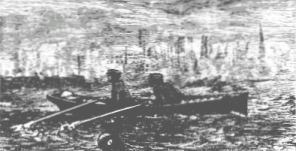
They looked out sharply on both sides to catch a sight of the little green boat. At last, when they had rowed about two miles, with the tide in their favor, Mr. Dale cried out, "I see it! I see it! But, ah! it is empty. I see no sign of a boy in it. What can have become of poor Walter?"
On they rowed, and at last, came up with the boat. Still no Walter was to be seen. The poor father was in despair, when all at once Walter started up from under the great blanket, where he had been hiding. He cried out, "Here I am, papa, safe and sound!"
"Oh, you little rogue! Come here and let me pull your ears!" They all got back to their home in time for a late tea, which mother had kept warm for them. Walter was kissed and then cuffed; but the cuffs were so tender, that they made him laugh even more than the kisses.
ALFRED STETSON.
"FLUTTER, FLUTTER!"
|
Flutter, flutter, with never a stop, All the leaves have begun to drop; While the wind, with a skip and a hop, Goes about gathering in his crop.
Flutter, flutter, on bustling-wings, All the plump little feathered things: Thrush and bobolink, finch and jay, Follow the sun on his holiday.
Flutter, flutter, the snowflakes all Jostle each other in their fall. Crowd and push into last year's nest, And hide the seeds from robin-redbreast.
Flutter, flutter, the hours go by; Nobody sees them as they fly; Nobody hears their fairy tread, Nor the rustle of their wings instead. |
MARY N. PRESCOTT.
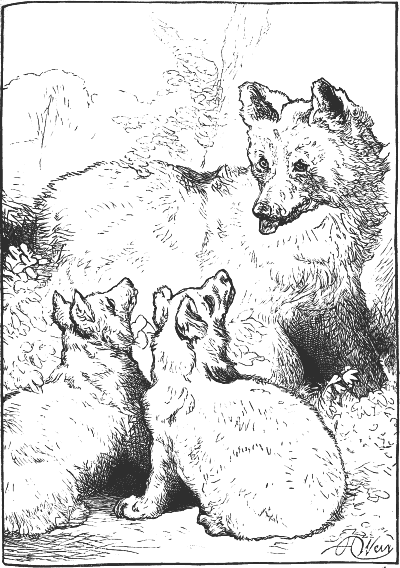 DRAWING-LESSON.
DRAWING-LESSON.
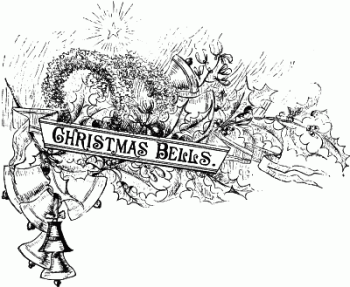
|
"Are you waking?" shout the breezes
To the tree-tops waving high, "Don't you hear the happy tidings Whispered to the earth and sky? Have you caught them in your dreaming, Brook and rill in snowy dells? Do you know the joy we bring you In the merry Christmas bells? Ding, dong! ding, dong, Christmas bells!
"Are you waking, flowers that slumber In the deep and frosty ground? Do you hear what we are breathing To the listening world around? For we bear the sweetest story That the glad year ever tells: How He loved the little children,— He who brought the Christmas bells! Ding, dong! ding, dong, Christmas bells! |
GEORGE COOPER.
JACK THE MAGPIE.

ne day last summer, a man in Colorado found a magpie by the roadside. Its wings had been clipped, so that it could not fly. The man gave it to a little boy named Ernest Hart.
He lived with his parents in a neat cottage near by a mountain stream. He ran home, and showed the bird to his sister Edith. They named it Jack.
Jack was quite a large bird. His body was black as coal; his breast was white; and his wings and tail shaded off into a dark green. His bill was long and very strong. He had a shrewd, knowing look. As he was quite tame, he must have been some one's pet.
He would hop and strut around in such a funny, pompous way, that one could not help laughing. He would take food from any one's hand, but would not let any one touch him, except Mr. Hart, the children's father.
To Mr. Hart he seemed to take a great liking. He would hop on to his hand or shoulder: he would follow him all over the place. As soon as Mr. Hart came into the house, Jack would stand outside the door, and scream to him to come out. Indeed, Jack was almost too fond of him.
One day when Mr. Hart was chopping wood, Jack kept laying his bill within two or three inches of the place where the axe fell. It seemed just as if he wanted his bill chopped off.
Jack could talk a little. He could say "pretty," "what," and "yes, sir." When hungry, he would come round to the kitchen-door. There he would keep up a loud chattering, till food was given him to eat.
Jack was shy of Marcus, the dog. But, while Marcus was eating his dinner, Jack would steal up, and seize a bone from the plate. Then he would run off and hide it.[Pg 20]
I believe that all magpies are thieves. I know that Jack was a sad thief. He would carry off almost any thing he saw lying about. One day he was caught in the act of carrying off the gardener's pipe.
It was fun for Ernest and Edith to watch him at his mischief. All summer they made much of him. Now, in October, though the trees are still green and the wild flowers are not gone, we have had in our Colorado home a taste of winter.
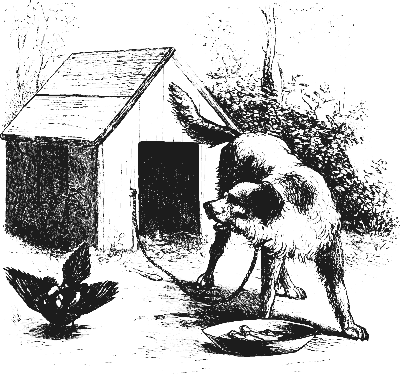
The ground has been white with snow. Jack is still with us, and seems quite happy. Edith and Ernest may stay here all winter. Perhaps I may tell you something of their winter sports. Would you like to hear it?
AUNT SADIE.
PORTRAITS FOR LITTLE FOLKS.
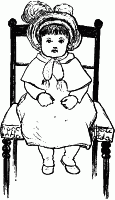
|
This is Master Baby, Paying a morning call, Sitting so good upon his chair, But speaking not at all. Listening to every word, The funny little man! Wondering at the news he hears, Thinking all he can. |
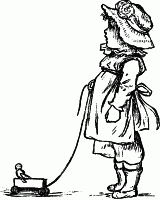
|
This little lady, I'd have you know, Is Miss Mary Vernon, With cheeks in a glow. She has a doll Bella, Quite dear to her heart, And takes her to ride In a nice little cart. |
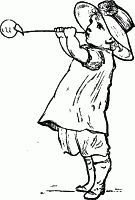
|
This is Tommy Trip: Bubbles he can blow; When a bubble breaks too soon, Tommy cries, "Don't go!" Older folks I know, Who their fine schemes make, And, when any fine scheme fails, Cry, "Oh, do not break!" |
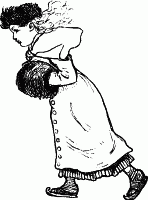
|
'Tis the winter cold, All the ponds are ice; Susan loves the winter cold, Calls the weather nice. Warm with muff and coat, She can go and skate; She can glide along the ice At a merry rate. |
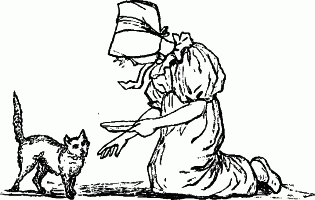
|
This is Mary Jane, See! she has a saucer: To her cat she says, "Give me up your paw, sir. I've some fresh, nice milk You will relish greatly." Pussy then put up her paw; All this happened lately. |

|
This is Baby May: She looks out to spy If her own dear papa comes On the road near by. Yes, she sees him now, He is coming fast; For he loves his Baby May, Loves her first and last. |
K.G.
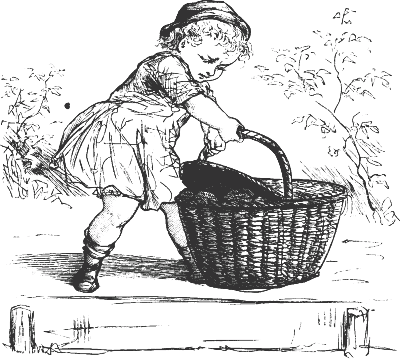
THE BASKET OF APPLES.
I.
Albert is a bright little fellow. He is not three years old; but he can read ten words in "The Nursery." These words are, cat, dog, cow, horse, bird, mother, father, brother, sister, apple.
One day, John the gardener left a basket of apples at the top of the garden-steps. Albert saw it, and knew it was meant for the house. "I will take it in," said he. "I am strong." [Pg 26]
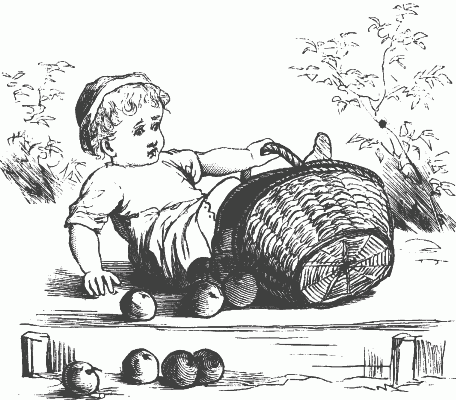
II.
But the basket was not so light as he had thought. Indeed it was quite heavy. Perhaps this was because it was full of apples. The gardener had just picked them from a fine old tree in the orchard.
Albert was a stout little fellow; but the basket was too much for him. In trying to lift it, he upset it; and some of the apples rolled out down the steps as fast as they could go. Perhaps they saw it was a good chance to run away.[Pg 27]
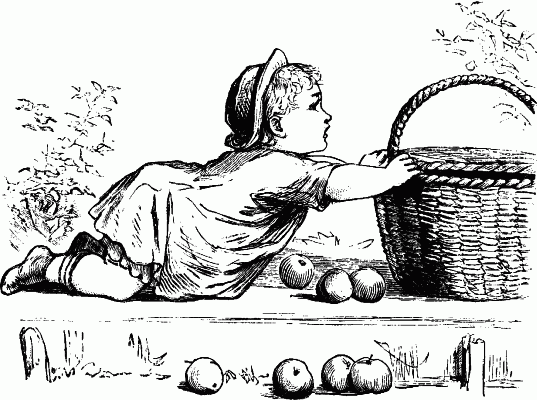
III.
Albert did not cry. He knew that crying would do no good. What was now the first thing to be done? Albert thought for a while, and said to himself, "The first thing to do is to set the basket upright."
He did not find it hard work to do this. All the apples had not run out. Some were still in the basket.
Albert picked up one, smelt of it, and then put it back. He next placed the basket upright.[Pg 28]
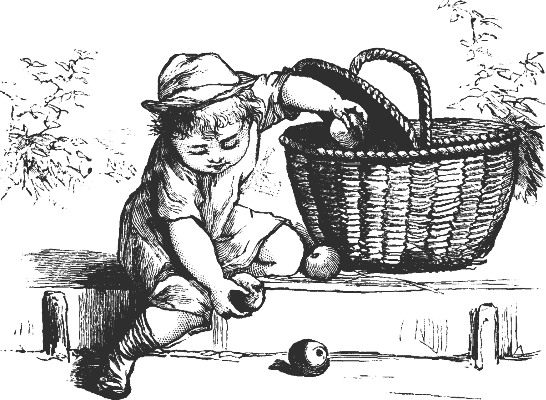
IV.
Having done this so that the basket stood firm, he said, "What is the next thing to do? The next thing to do is to put back the apples; and I am the boy that can do it."
And he did it well. He did not once think of keeping any of the apples for himself; nor did he even take a bite of one of them. He was a good boy, and too honest for that.
If any one had said to him, "Give me an apple," Albert would have said, "The apples are not mine to give."[Pg 29]
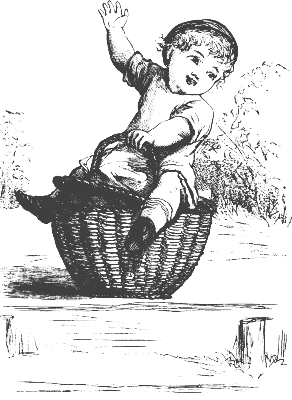
V.
"Now it is all right again," said Albert. "What next? If the basket will not let me carry it, the basket shall carry me. That would be fair play."
So he mounted the basket, as you see, took hold of the handle with his left hand, and cried out, "Get up, sir!" He made believe it was a horse. "Get up, sir!" he cried. But the horse would not move.[Pg 30]
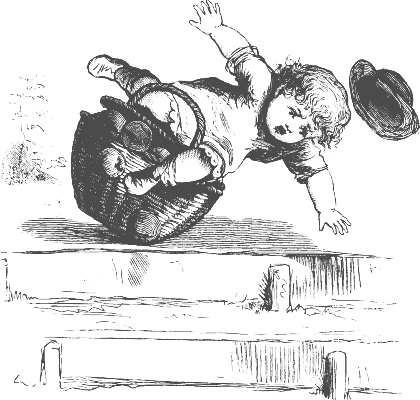
VI.
Albert then began to shake the basket, as if to urge it on. Ah, me! who would have thought to see it play the gay horse in earnest? It seemed so gentle!
Who would have thought to see it shy, and kick up, and throw Albert off? But so it did. Albert put out both hands to save himself, but he could not keep his seat. Over he went.[Pg 31]
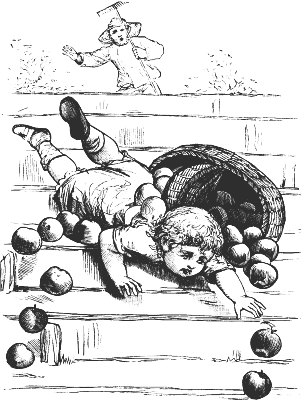
VII.
Over went the basket. Albert, apples, and all rolled down the steps. "Help!" he cried. The gardener ran up to see what was the matter.
"Where are my apples?" said he. "Here!" said Albert, jumping up, for the lucky rogue was not hurt a bit.
UNCLE SAM.
CHRISTMAS.
Words by ALFRED SELWYN.[A]
Music by T. CRAMPTON.
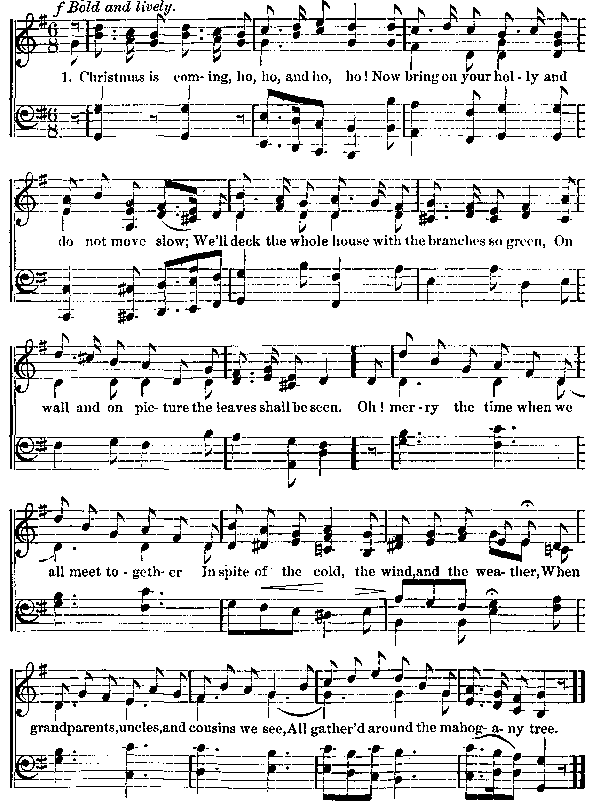
1.
Christmas is coming, ho, ho, and ho, ho!
Now bring on your holy and do not move slow;
We'll deck the whole house with the branches so green,
On wall and on picture the leaves shall be seen.
Oh! merry the time when we all meet together
In spite of the cold, the wind, and the weather,
When grandparents, uncles, and cousins we see,
All gather'd around the mahogany tree.
2.
It stands in the hall, the mahogany tree;
And very nice fruit it will bear, you'll agree;
The turkeys and capons, the puddings and pies,
On Christmas day feed something more than the eyes.
The poor and the needy then come to our door,
And carry off with them a bountiful store
Of all the good things that we have for ourselves,
In cupboard and cellar, on table and shelves.
3.
When dinner is ended, what sound do we hear
From holly-deck'd parlor ring merry and clear?
'Tis Uncle Tom's fiddle! the tune is a call
To all the good people to come to our ball.
They come, young and old, and partake of our cheer,
For old Christmas comes only once in a year!
Then hand up the holly, and let us prepare
The house for the pleasure in which all can share.
FOOTNOTE:
ADVERTISEMENTS.
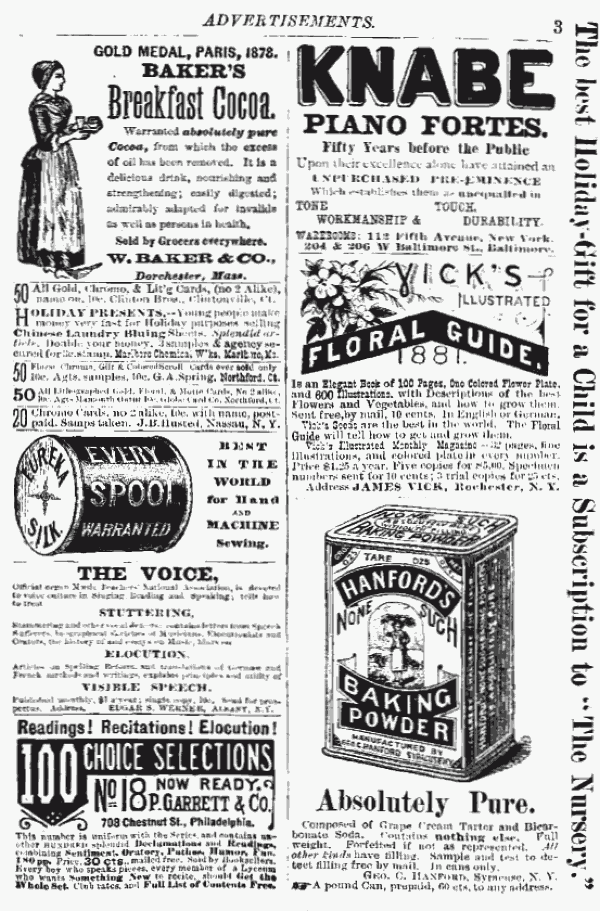
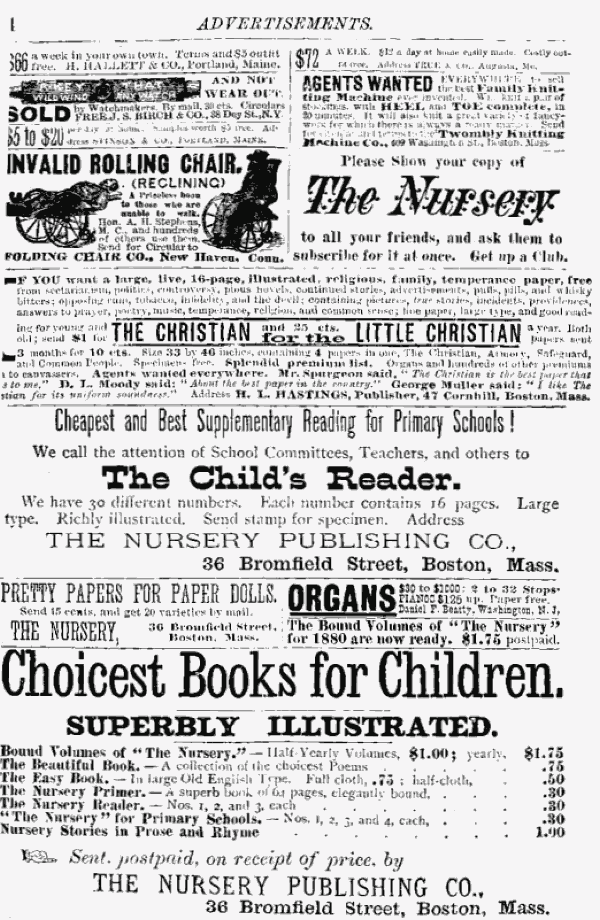
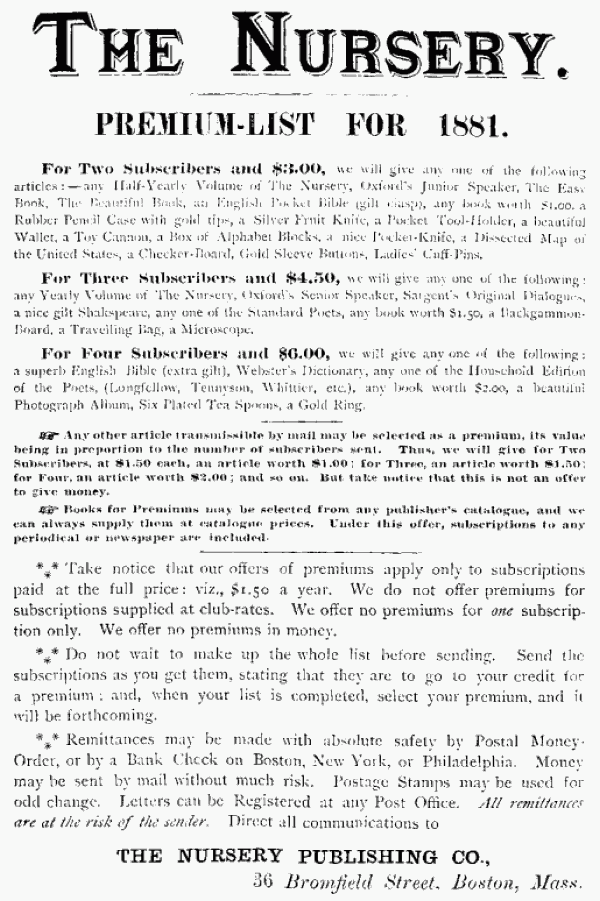
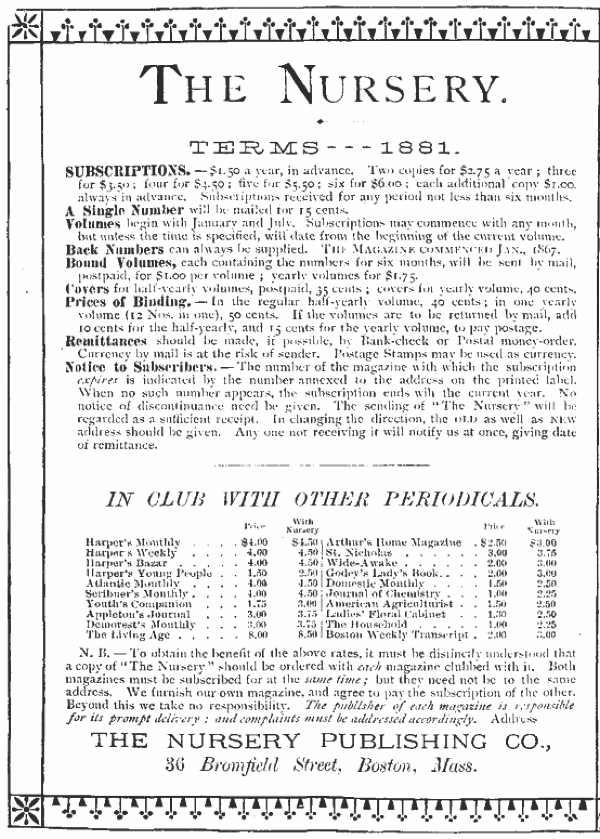
GOLD MEDAL, PARIS, 1878. BAKER'S Breakfast Cocoa.
Warranted absolutely pure Cocoa, from which the excess of oil has been removed. It is a delicious drink, nourishing and strengthening; easily digested; admirably adapted for invalids as well as persons in health.
Sold by Grocers everywhere. W. BAKER & CO., Dorchester, Mass.
50 All Gold, Chromo, & Lit'g Cards, (no 2 Alike), name on, 10c. Clinton Bros., Clintonville, Ct.
HOLIDAY PRESENTS.—Young people make money very fast for Holiday purposes selling Chinese Laundry Bluing Sheets. Splendid article. Double your money. 3 samples & agency secured for 3c. stamp. Marlboro Chemical W'ks, Marlboro, Ms.
50 Finest Chromo, Gilt & Colored Scroll Cards ever sold only 10c. Agts. samples, l0c. G.A. Spring, Northford, Ct.
50 All Lithographed Gold, Floral, & Motto Cards, No 2 alike, 10c. Agts. Mammoth Outfit. 10c. Globe Card Co. Northford, Ct.
20 Chromo Cards, no 2 alike, 10c. with name, postpaid. Samps taken. J.B. Husted, Nassau, N.Y.
[Illustration: Eureka Silk. Every Spool Warranted]
BEST IN THE WORLD for Hand and MACHINE Sewing.
THE VOICE,
Official organ Music Teachers' National Association, is devoted to voice culture in Singing, Reading and Speaking; tells how to treat
STUTTERING,
Stammering and other vocal defects: contains letters from Speech Sufferers, biographical sketches of Musicians, Elocutionists and Orators, the history of and essays on Music, hints on
ELOCUTION,
Articles on Spelling Reform, and translations of German and French methods and writings, explains principles and utility of
VISIBLE SPEECH.
Published monthly, $1 a year; single copy, 10c. Send for prospectus. Address, EDGAR S. WERNER, ALBANY, N.Y.
Readings! Recitations! Elocution!
100 CHOICE SELECTIONS
No. 18 NOW READY
P. GARRETT & CO.
708 Chestnut St., Philadelphia.
This number is uniform with the Series, and contains another HUNDRED splendid Declamations and Readings, combining Sentiment, Oratory, Pathos, Humor, Fun. 180pp. Price, 30 cts., mailed free. Sold by Booksellers. Every boy who speaks pieces, every member of a Lyceum who wants Something New to recite, should Get the Whole Set. Club rates, and Full List of Contents Free.
KNABE
PIANO FORTES.
Fifty Years before the Public
Upon their excellence alone have attained an
UNPURCHASED PRE-EMINENCE
Which establishes them as unequalled in
TONE, TOUCH, WORKMANSHIP & DURABILITY.
WAREROOMS: 113 Fifth Avenue, New York. 204 & 206 W Baltimore St., Baltimore.
[Illustration]
VICK'S ILLUSTRATED FLORAL GUIDE. 1881.
Is an Elegant Book of 100 Pages, One Colored Flower Plate, and 600 Illustrations, with Descriptions of the best Flowers and Vegetables, and how to grow them. Sent free, by mail, 10 cents. In English or German.
Vick's Seeds are the best in the world. The Floral Guide will tell how to get and grow them.
Vick's Illustrated Monthly Magazine—32 pages, fine illustrations, and colored plate in every number. Price $1.25 a year. Five copies for $5.00. Specimen numbers sent for 10 cents; 3 trial copies for 25 cts.
Address JAMES VICK, Rochester, N.Y.
[Illustration: HANFORD'S NONE SUCH BAKING POWDER.]
Absolutely Pure.
Composed of Grape Cream Tarter and Bicarbonate Soda. Contains nothing else. Full weight. Forfeited if not as represented. All other kinds have filling. Sample and test to detect filling free by mail. In cans only.
GEO. C. HANFORD, Syracuse, N.Y.
[Symbol: Pointing hand] A pound Can, prepaid, 60 cts, to any address.[Pg 34]
ADVERTISEMENTS.
$66 a week in your own town. Terms and $5 outfit free. H. HALLETT & CO., Portland, Maine.
[Illustration] AND NOT WEAR OUT.
SOLD by Watchmakers. By mail. 30 cts. Circulars FREE. J.S. BIRCH & CO., 38 Dey St., N.Y.
$5 to $20 per day at home. Samples worth $5 free. Address STINSON & CO., PORTLAND, MAINE.
INVALID ROLLING CHAIR. (RECLINING)
[Illustration]
A Priceless boon to those who are unable to walk. Hon. A.H. Stephens, M.C., and hundreds of others use them. Send for Circular to FOLDING CHAIR CO., New Haven, Conn.
$72 A WEEK. $12 a day at home easily made. Costly outfit free. Address TRUE & CO., Augusta, Me.
AGENTS WANTED EVERYWHERE to sell the best Family Knitting Machine ever invented. We knit a pair of stockings, with HEEL and TOE complete, in 20 minutes. It will also knit a great variety of fancywork for which there is always a ready market. Send for circular and terms to the 'Twombly Knitting Machine Co., 409 Washington St., Boston, Mass.
Please Show your copy of
THE NURSERY
to all your friends, and ask them to subscribe for it at once. Get up a Club.
If you want a large, live, 16-page, illustrated, religious, family, temperance paper, free from sectarianism, politics, controversy, pious novels, continued stories, advertisements, puffs, pills, and whisky bitters; opposing rum, tobacco, infidelity, and the devil; containing pictures, true stories, incidents, providences, answers to prayer, poetry, music, temperance, religion, and common sense; fine paper, large type, and good reading for young and old; send $1 for THE CHRISTIAN and 25 cts. for the LITTLE CHRISTIAN a year. Both papers sent 3 months for 10 cts. Size 33 by 46 inches, containing 4 papers in one, The Christian, Armory, Safeguard, and Common People. Specimens free. Splendid premium list. Organs and hundreds of other premiums to canvassers. Agents wanted everywhere. Mr. Spurgeon said, "The Christian is the best paper that is to me." D.L. Moody said: "About the best paper in the country." George Muller said: "I like The Christian for its uniform soundness." Address H.L. HASTINGS, Publisher, 47 Cornhill, Boston, Mass.
Cheapest and Best Supplementary Reading for Primary Schools!
We call the attention of School Committees, Teachers, and others to
The Child's Reader.
We have 30 different numbers. Each number contains 16 pages. Large type. Richly illustrated. Send stamp for specimen. Address
THE NURSERY PUBLISHING CO., 36 Bromfield Street, Boston, Mass.
PRETTY PAPER FOR PAPER DOLLS. Send 15 cents, and get 20 varieties by mail. THE NURSERY, 36 Bromfield Street, Boston, Mass.
ORGANS $30 to $1000; 2 to 32 Stops PIANOS $125 up. Paper free. Daniel F. Beatty. Washington, N.J.
The Bound Volumes of "The Nursery" for 1880 are now ready. $1.75 postpaid.
Choicest Books for Children
SUPERBLY ILLUSTRATED.
Bound Volumes of "The Nursery."—Half-Yearly Volumes, $1.00; yearly, $1.75 The Beautiful Book.—A collection of the choicest Poems ... $.75 The Easy Book.—In large Old English Type. Full cloth, .75; half-cloth, .50 The Nursery Primer.—A superb book of 64 pages, elegantly bound, .30 The Nursery Reader.—Nos. 1, 2, and 3, each .30 "The Nursery" for Primary Schools.—Nos. 1, 2, 3, and 4, each, .30 Nursery Stories in Prose and Rhyme 1.00
Sent postpaid, on receipt of price, by
THE NURSERY PUBLISHING CO., 36 Bromfield Street, Boston, Mass.[Pg 35]
THE NURSERY.
PREMIUM-LIST FOR 1881.
For Two Subscribers and $3.00, we will give any one of the following articles:—any Half-Yearly Volume of The Nursery, Oxford's Junior Speaker, The Easy Book, The Beautiful Book, an English Pocket Bible (gilt clasp), any book worth $1.00, a Rubber Pencil Case with gold tips, a Silver Fruit Knife, a Pocket Tool-Holder, a beautiful Wallet, a Toy Cannon, a Box of Alphabet Blocks, a nice Pocket-Knife, a Dissected Map of the United States, a Checker-Board, Gold Sleeve Buttons, Ladies' Cuff-Pins.
For Three Subscribers and $4.50, we will give any one of the following: any Yearly Volume of The Nursery, Oxford's Senior Speaker, Sargent's Original Dialogues, a nice gilt Shakspeare, any one of the Standard Poets, any book worth $1.50, a Backgammon-Board, a Travelling Bag, a Microscope.
For Four Subscribers and $6.00, we will give any one of the following: a superb English Bible (extra gilt), Webster's Dictionary, any one of the Household Edition of the Poets, (Longfellow, Tennyson, Whittier, etc.), any book worth $2.00, a beautiful Photograph Album, Six Plated Tea Spoons, a Gold Ring.
Any other article transmissible by mail may be selected as a premium, its value being in proportion to the number of subscribers sent. Thus, we will give for Two Subscribers, at $1.50 each, an article worth $1.00; for Three, an article worth $1.50; for Four, an article worth, $2.00; and so on. But take notice that this is not an offer to give money.
Books for Premiums may be selected from any publisher's catalogue, and we can always supply them at catalogue prices. Under this offer, subscriptions to any periodical or newspaper are included.
Take notice that our offers of premiums apply only to subscriptions paid at the full price: viz., $1.50 a year. We do not offer premiums for subscriptions supplied at club-rates. We offer no premiums for one subscription only. We offer no premiums in money.
Do not wait to make up the whole list before sending. Send the subscriptions as you get them, stating that they are to go to your credit for a premium; and, when your list is completed, select your premium, and it will be forthcoming.
Remittances may be made with absolute safety by Postal Money Order, or by a Bank Check on Boston, New York, or Philadelphia. Money may be sent by mail without much risk. Postage Stamps may be used for odd change. Letters can be Registered at any Post Office. All remittances are at the risk of the sender. Direct all communications to
THE NURSERY PUBLISHING CO., 36 Bromfield Street, Boston, Mass.[Pg 36]
THE NURSERY
TERMS—1881.
SUBSCRIPTIONS.—$1.50 a year, in advance. Two copies for $2.75 a year; three for $3.50; four for $4.50; five for $5.50; six for $6.00; each additional copy $1.00, always in advance. Subscriptions received for any period not less than six months.
A Single Number will be mailed for 15 cents.
Volumes begin with January and July. Subscriptions may commence with any month, but unless the time is specified, will date from the beginning of the current volume.
Back Numbers can always be supplied. THE MAGAZINE COMMENCED JAN., 1867.
Bound Volumes, each containing the numbers for six months, will be sent by mail, postpaid, for $1.00 per volume; yearly volumes for $1.75.
Covers for half-yearly volumes, postpaid, 35 cents; covers for yearly volume, 40 cents.
Prices Of Binding.—In the regular half-yearly volume, 40 cents; in one yearly volume (12 Nos. in one), 50 cents. If the volumes are to be returned by mail, add 10 cents for the half-yearly, and 15 cents for the yearly volume, to pay postage.
Remittances should be made, if possible, by Bank-check or Postal money-order. Currency by mail is at the risk of sender. Postage Stamps may be used as currency.
Notice to Subscribers.—The number of the magazine with which the subscription expires is indicated by the number annexed to the address on the printed label. When no such number appears, the subscription ends wih the current year. No notice of discontinuance need be given. The sending of "The Nursery" will be regarded as a sufficient receipt. In changing the direction, the OLD as well as NEW address should be given. Any one not receiving it will notify us at once, giving date of remittance.
IN CLUB WITH OTHER PERIODICALS.
| Price | With Nursery |
| Harper's Monthly........$4.00 | $4.50 |
| Harpers Weekly...........4.00 | 4.50 |
| Harper's Bazar...........4.00 | 4.50 |
| Harper's Young People....1.50 | 2.50 |
| Atlantic Monthly.........4.00 | 4.50 |
| Scribner's Monthly.......4.00 | 4.50 |
| Youth's Companion........1.75 | 3.00 |
| Appleton's Journal.......3.00 | 3.75 |
| Demorest's Monthly.......3.00 | 3.75 |
| The Living Age...........8.00 | 8.50 |
| Arthur's Home Magazine...2.50 | 3.00 |
| St. Nicholas.............3.00 | 3.75 |
| Wide-Awake...............2.00 | 3.00 |
| Godey's Lady's Book......2.00 | 3.00 |
| Domestic Monthly.........1.50 | 2.50 |
| Journal of Chemistry.....1.00 | 2.25 |
| American Agriculturist...1.50 | 2.50 |
| Ladies' Floral Cabinet...1.30 | 2.50 |
| The Household............1.00 | 2.25 |
| Boston Weekly Transcript 2.00 | 3.00 |
N.B.—To obtain the benefit of the above rates, it must be distinctly understood that a copy of "The Nursery" should be ordered with each magazine clubbed with it. Both magazines must be subscribed for at the same time; but they need not be to the same address. We furnish our own magazine, and agree to pay the subscription of the other. Beyond this we take no responsibility. The publisher of each magazine is responsible for its prompt delivery; and complaints must be addressed accordingly. Address
THE NURSERY PUBLISHING CO., 36 Bromfield Street, Boston, Mass.